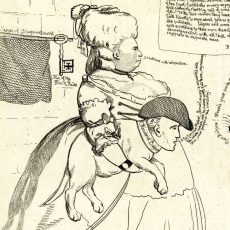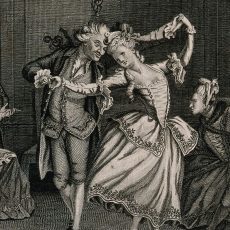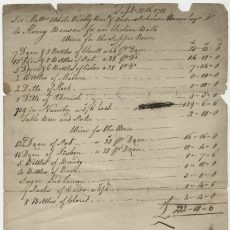Oct
1774
westminster
Contested
GENERAL ELECTION
Poll book data from:
Citation: A correct copy of the poll… (London: Cox & Bigg, 1774)
Source: John Sims (ed.), A Handlist of British Parliamentary Poll Books (Leicester, 1984); Jeremy Gibson and Colin Rogers (eds.), Poll Books, 1696–1872: A Directory of Holdings in Great Britain (4th edn., Bury, 2008); L. W. L. Edwards (ed.), Catalogue of Directories and Poll Books in the Possession of the Society of Genealogists (4th edn., 1984).
Timeline & Key Statistics
Contexts & Remarks
Transcription completed by the London Electoral History 1700-1850 project, undertaken by Penelope J. Corfield, Edmund M. Green, and Charles Harvey.
Dates: Tuesday 11 Oct. 1774-Wednesday 26 Oct. 1774.
Poll book reference: A correct copy of the poll... (London: Cox & Bigg, 1774).
Candidates: Hugh Percy, Earl Percy (Government); Lord Thomas Pelham Clinton (Government); Hervey Redmond Morres, Viscount Mountmorres (Radical); Charles Stanhope, Viscount Mahon (Radical); and Humphrey Cotes (Radical).
Lord Percy was a returning candidate, having been elected for Westminster since 1763. Percy was also the son of the duke of Northumberland, a notable landowner in Westminster.
The 22-year-old, Lord Thomas Pelham Clinton, was the son of the 2nd duke of Newcastle, another significant Westminster landowner. Clinton was supported by George III and put forward by Prime Minister Lord North, whose government paid for all election expenses for Clinton. Lord North wrote that, 'I am convinced that nothing can be ultimately so detrimental to the Government as that the faction should conceive themselves capable of carrying all their points by noise and intimidation'. He continued to report to the duke of Newcastle, 'I never knew the King more earnest on any point. He has been informed of the great probability of your son's success, and dreads nothing so much as the reputation of abandoning so fair a prospect from the dread of noise, riot, and scurrility. ... We will take all the trouble of the canvass off your Grace's hands' (Newcastle [Clumber] Mss).
Lord Mountmorres of Castle Morres was an Irish peer from County Kilkenny. In the 1750s, he had served as MP for Irishtown. His campaign was supported by the radical John Wilkes, who stood for Middlesex.
Lord Mahon, the son of the 2nd earl Stanhope, had previously served on the Genevese Council of Two Hundred before standing for Westminster. Standing on 'democratic principles', his campaign was similarly supported by John Wilkes.
Humphrey Cotes, a friend of John Wilkes and Lord Temple, had previously been a wine merchant in Mincing Lane.
Over the course of the election, William Phillips, friend of the duke of Newcastle, reported, 'You have secured Westminster to yourself for one Member certain, if not more than that ... I apprehend you mean to preserve it ... Some expense, great attention, and some little trouble on your Grace's part is all that is necessary'. Both Percy and Clinton were returned for the borough with over 4,000 votes each, in comparison with over 2,300 for Mountmorres and Mahon. Cotes came in last place, with only 130 in total.
Poll Book
Below is a digitised version of the poll book for this election:





